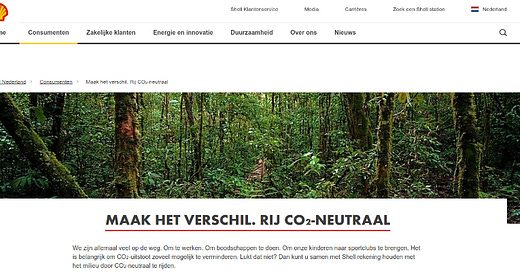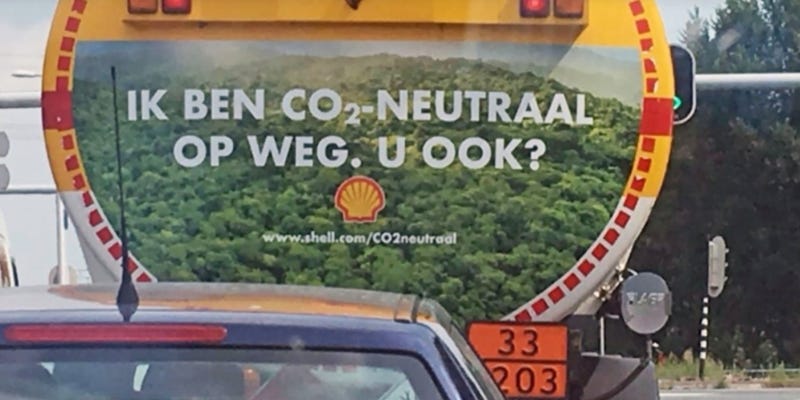Dutch Advertising Watchdog rules Shell’s “CO₂ Neutral” campaign is greenwash
The Dutch Advertising Code Commission recently ruled that Shell’s “CO₂ neutral” adverts are misleading. The ruling follows a complaint filed by nine law students at the Vrije Universiteit in Amsterdam.
Shell offers drivers in the Netherlands, and other countries, the option of adding €0.01 per litre to the price of petrol. Shell uses the money mainly to buy carbon offsets from two REDD projects (Katingan Mentaya in Indonesia and Cordillera Azul in Peru). Some of the money also goes to tree planting projects.
The Advertising Code Commission agreed with the nine students that Shell could not prove that it is fully offsetting the greenhouse gas emissions from driving. While the impact on the climate of CO₂ emissions from driving is certain, Shell cannot guarantee exactly how much CO₂ has not been emitted as a result of its REDD credits. Apart from anything else, the calculation is based on a counterfactual story about what would have happened in the absence of the project. This counterfactual story is impossible to verify – because the project did go ahead.
Shell’s petrol tankers: “I am CO₂ neutral”
A second complaint came from André Kodde against an advert on the back of Shell’s petrol tankers:
The text translates as “I’m on the road to CO₂ neutrality”, but because the words “I am CO₂ neutral” are on the top line it gives the impression that Shell (or at least its petrol tanker) is claiming to be CO₂ neutral. The Advertising Code Commission agreed with Kodde. The tanker carries fossil fuel which is “undeniably not CO₂ neutral” the Commission ruled.
Shell: “Drive CO₂ neutral”
The nine law students’ complaint was about statements on Shell’s website:
Make a difference. Drive CO₂ neutral
We are all on the road a lot. To work. To go shopping. To take our kids to sports clubs. It is important to reduce CO₂ emissions as much as possible. Doesn’t work? Then, together with Shell, you can take the environment into account by driving CO₂-neutrally.
Driving CO₂-neutral is now even easier. With compensation ON you now automatically drive CO₂ neutral. That way you will never forget it. Or opt for compensation per refueling. Read more about the possibilities.
The Advertising Code Commission notes that “The complainants base their allegations on various (scientific) publications and climate reports, including the Climate Change Synthesis Report (2014) of the Intergovernmental Panel on Climate Change (IPCC).” And the Commission sums up the complaint as follows:
[T]he suggestion that by paying an additional cent per litre for the carbon credits, motorists neutralise the damage is incorrect: it is scientifically certain that a measurable CO₂ pollution is released during the production and use of fossil fuels that is permanently included in the carbon cycle of the planet, thereby damaging the climate. By contrast, the activities touted as offsetting do not physically extract any additional amount of CO₂ from the carbon cycle, let alone do so in a permanent, measurable and scientifically certain way. There is therefore no actual equivalence between CO₂ pollution from fossil fuels and the activities that are advertised as so-called compensation for this CO₂ pollution: those activities cannot actually compensate for the pollution.
In its response to the complaint, Shell argued that “One CO₂ credit stands for avoiding or removing 1 tonne of CO₂ from the atmosphere.” Shell bought enough carbon credits to offset the life cycle of the oil, “well to wheel CO₂ emissions”. Shell argued that carbon offsetting is “an internationally accepted way to achieve ‘carbon neutrality'” that Dutch consumers are familiar with, and that Shell’s carbon credits are from projects that are certified according to internationally recognised voluntary standards.
Permanence “uncertain”
The complainants cited a series of reports, including a 2021 paper in Nature that states,
The permanence of such biological removals remains uncertain. The long-term carbon-storage capacity of forests and soils is not well known, and there can be no guarantee that a forest won’t later be logged, devastated by a forest fire or altered by climate change.
The source for this statement is Intergovernmental Panel on Climate Change’s 2019 Special Report on Climate Change and Land.
Shell failed to demonstrate that CO₂ neutrality can be achieved
In its ruling, the Commission states that Shell is making an environmental claim and according to the Environmental Advertising Code, Shell “must demonstrate that its environmental claims are correct”. The Commission ruled that Shell could not demonstrate that the harmful effect of CO₂ emissions from driving is completely negated by the carbon credits that Shell bought.
The Commission ruled that,
[I]t would have been up to Shell to demonstrate (on the basis of, for example, measurement data) that emissions and compensation are indeed comparable and that CO₂ neutrality can actually be achieved. To this end, Shell should have demonstrated that the effect of Shell’s compensation measures can be measured with such precision that this measurement can serve as a basis for the claim that by paying one extra cent per litre the adverse effect on the environment in terms of the use of the fossil fuel is guaranteed to be eliminated.
“Shell has not demonstrated this,” the Commission ruled.
The Commission ruled that the fact that Shell’s offsetting projects met Verra’s and the Climate, Community and Biodiversity Alliance’s standards, was not enough:
With regard to the certified projects in which it participates, Shell has demonstrated that these have been carefully selected and meet strict requirements, and that Shell actively ensures that these projects continue to meet the requirements. However, this does not change the fact that meeting these theoretical, contractual standards is insufficient to substantiate Shell’s absolute environmental claim, in the absence of sound, independent, verifiable and widely recognised evidence.
The Commission ruled that Shell’s statement, “Make a difference, Drive CO₂ neutral” was too absolute. “It has not been demonstrated that the CO₂ emissions of kilometres driven have no negative impact on the environment, even though this is claimed,” the Commission stated.
The Commission recommends that Shell “no longer advertises in such a way”. Shell has amended its website to read “Make the difference. Offset CO₂ emissions”. But the text below the headline still reads “together with Shell, you can take the environment into account by driving CO₂ neutral.
Nevertheless the Commission’s ruling is important. Shell could not provide “sound, independent, verifiable and widely recognised evidence” to demonstrate that its offsets negated the emissions from burning fossil fuels. Shell could not do so because no such evidence exists. Time to scrap offsets.








